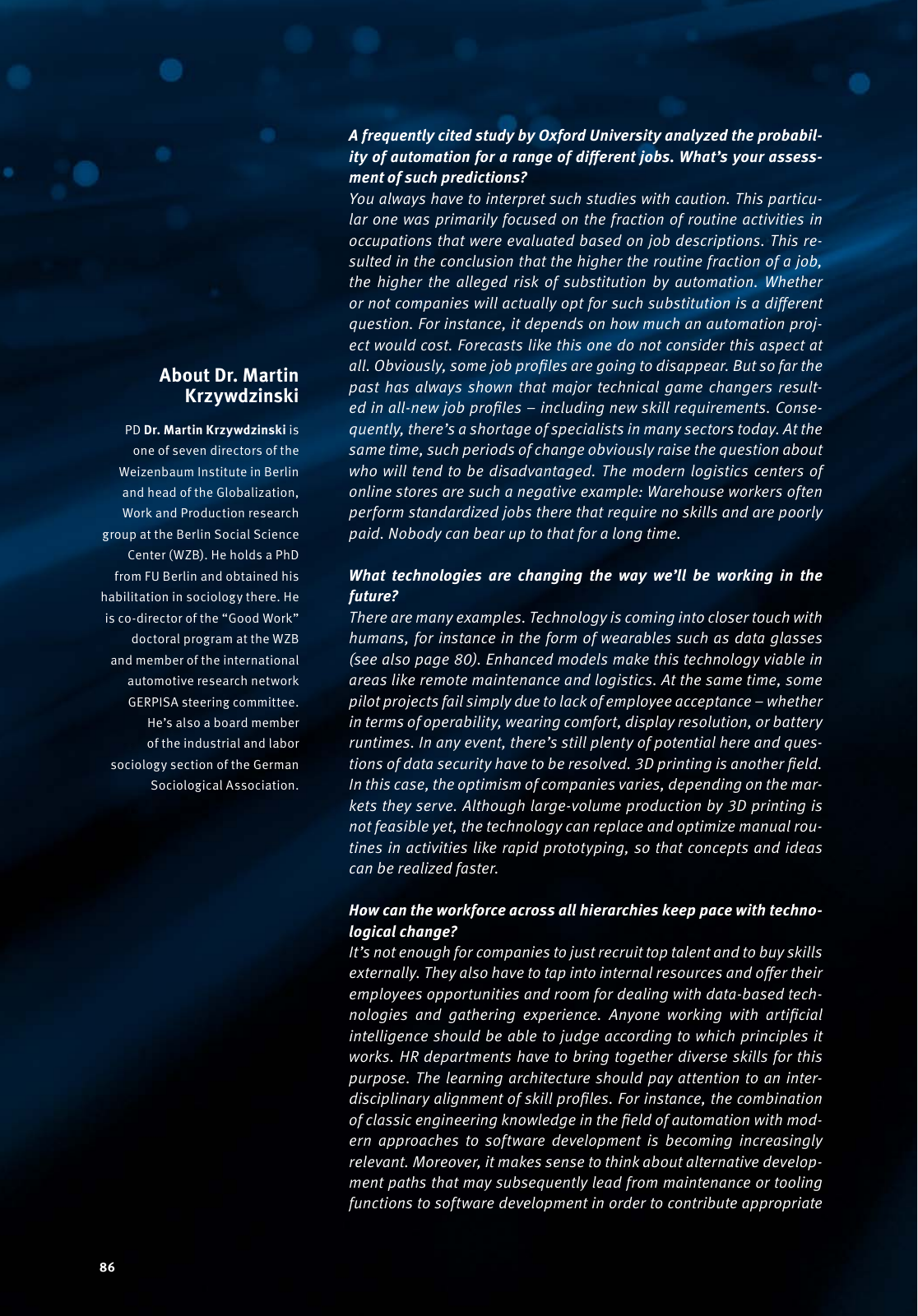A frequently cited study by Oxford University analyzed the probabil ity of automation for a range of different jobs What s your assess ment of such predictions You always have to interpret such studies with caution This particu lar one was primarily focused on the fraction of routine activities in occupations that were evaluated based on job descriptions This re sulted in the conclusion that the higher the routine fraction of a job the higher the alleged risk of substitution by automation Whether or not companies will actually opt for such substitution is a different question For instance it depends on how much an automation proj ect would cost Forecasts like this one do not consider this aspect at all Obviously some job profiles are going to disappear But so far the past has always shown that major technical game changers result ed in all new job profiles including new skill requirements Conse quently there s a shortage of specialists in many sectors today At the same time such periods of change obviously raise the question about who will tend to be disadvantaged The modern logistics centers of online stores are such a negative example Warehouse workers often perform standardized jobs there that require no skills and are poorly paid Nobody can bear up to that for a long time What technologies are changing the way we ll be working in the future There are many examples Technology is coming into closer touch with humans for instance in the form of wearables such as data glasses see also page 80 Enhanced models make this technology viable in areas like remote maintenance and logistics At the same time some pilot projects fail simply due to lack of employee acceptance whether in terms of operability wearing comfort display resolution or battery runtimes In any event there s still plenty of potential here and ques tions of data security have to be resolved 3D printing is another field In this case the optimism of companies varies depending on the mar kets they serve Although large volume production by 3D printing is not feasible yet the technology can replace and optimize manual rou tines in activities like rapid prototyping so that concepts and ideas can be realized faster How can the workforce across all hierarchies keep pace with techno logical change It s not enough for companies to just recruit top talent and to buy skills externally They also have to tap into internal resources and offer their employees opportunities and room for dealing with data based tech nologies and gathering experience Anyone working with artificial intelligence should be able to judge according to which principles it works HR departments have to bring together diverse skills for this purpose The learning architecture should pay attention to an inter disciplinary alignment of skill profiles For instance the combination of classic engineering knowledge in the field of automation with mod ern approaches to software development is becoming increasingly relevant Moreover it makes sense to think about alternative develop ment paths that may subsequently lead from maintenance or tooling functions to software development in order to contribute appropriate About Dr Martin Krzywdzinski PD Dr Martin Krzywdzinski is one of seven directors of the Weizenbaum Institute in Berlin and head of the Globalization Work and Production research group at the Berlin Social Science Center WZB He holds a PhD from FU Berlin and obtained his habilitation in sociology there He is co director of the Good Work doctoral program at the WZB and member of the international automotive research network GERPISA steering committee He s also a board member of the industrial and labor sociology section of the German Sociological Association 86

Hinweis: Dies ist eine maschinenlesbare No-Flash Ansicht.
Klicken Sie hier um zur Online-Version zu gelangen.
Klicken Sie hier um zur Online-Version zu gelangen.